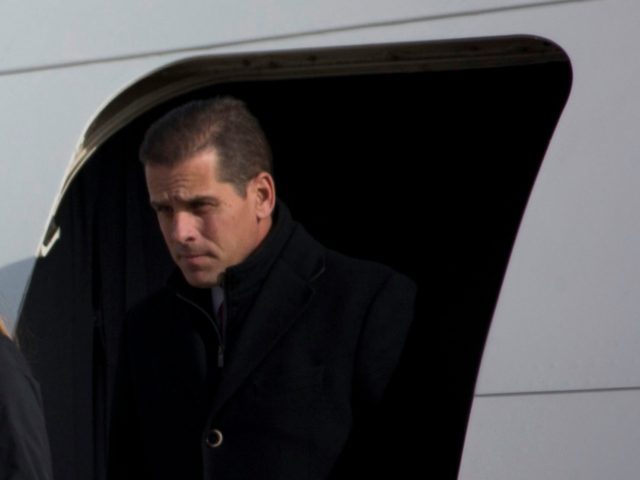Hunter Biden, former Vice President Joe Biden’s youngest son, made his first public appearance this past weekend amid mounting controversy over his business ties to China and Ukraine.
The 49-year-old, who had disappeared from public view since the launch of his father’s campaign in April, sat down for an exclusive interview with ABC News at his home in Los Angeles, California. The interview, which will air on Tuesday—before the fourth Democrat presidential primary debate, was reportedly extensive, with no questions “off limits.”
Hunter Biden’s sit down with ABC News comes as his foreign business dealings have spilled out into the open. The controversy started last month when President Donald Trump suggested the Ukrainian government probe how the younger Biden secured an appointment to the board of directors of Burisma Holdings. Hunter Biden joined the Ukrainian oil and gas giant in 2014 around the same time his father was appointed to oversee Obama administration policy in the region.
As Peter Schweizer, senior contributor at Breitbart News, detailed in his book Secret Empires: How the American Political Class Hides Corruption and Enriches Family and Friends, Hunter Biden secured the position, which paid as much as $83,000 per month despite having no background in the energy industry or Ukraine. Hunter Biden’s lack of experience, coupled with his father’s influence over Ukraine, immediately raised questions from ethics watchdogs in both the U.S. and Europe about a conflict of interest.
Furthering the ethical cloud over the appointment is that it came during the same month that Mykola Zlochevsky, Burisma’s founder, had his assets seized in the United Kingdom for suspicion of money laundering. Some have speculated Hunter Biden’s ascension to Burisma’s board was an attempt by Zlochevsky to curry favor with western leaders to prevent further scrutiny of his business dealings.
A brazen attempt would not be totally ill-suited for Zlochevsky. The Burisma founder is rumored to be one of eastern Europe’s top oligarchs, a position obtained while serving in the Ukrainian government under former President Viktor Yanukovych — a staunch ally of Russian President Vladimir Putin. It was during his tenure in government as Ukraine’s minister of natural resources that Burisma received its oil and gas licenses.
It is in the context of Burisma and Zlochevsky’s legal troubles that Joe Biden’s political influence has raised the most red flags. The former vice president has particularly drawn questions over his conduct in demanding the Ukrainian government fire its top prosecutor, Viktor Shokin, in 2016. Biden, who has publicly bragged about the firing, reportedly threatened to withhold more than one billion dollars in U.S. aid if the Ukrainian government did not remove Shokin. He has claimed the demand came from then-President Barack Obama, who had allegedly lost faith in the prosecutor’s ability to tackle corruption.
Unofficially, though, it was known that Shokin was investigating both Burisma and Zlochevsky for public corruption. It is uncertain if the probe extended to Hunter Biden, although Shokin has recently admitted that prior to his ouster he was warned to back off the matter. Regardless of what occurred, Shokin’s successor dropped the investigation into Burisma and Zlochevsky, allowing the oligarch to return to the country after having fled in 2014.
Apart from Burisma, Hunter Biden is also under fire for his dealings with Bohai Harvest RST (BHR), a private equity firm bankrolled by the Chinese government. Hunter Biden inked a multibillion dollar deal creating the firm with a subsidiary of the state-owned Bank of China in 2013.
The timing of the lucrative deal has been brought into question, as it came only 12 days after Hunter visited China with his father aboard Air Force Two. Officially, the then-vice president was visiting the country amid escalating tensions over islands in the South China Sea and decided to bring his granddaughter and son along. In a March 2018 interview with Breitbart News Tonight, however, Schweizer detailed the political machinations that preceded Hunter Biden’s $1.5 billion venture with China:
In December of 2013, Vice President Joe Biden flies to Asia for a trip, and the centerpiece for that trip is a visit to Beijing, China. To put this into context, in 2013, the Chinese have just exerted air rights over the South Pacific, the South China Sea. They basically have said, ‘If you want to fly in this area, you have to get Chinese approval. We are claiming sovereignty over this territory.’ Highly controversial in Japan, in the Philippines, and in other countries. Joe Biden is supposed to be going there to confront the Chinese. Well, he gets widely criticized on that trip for going soft on China. For basically not challenging them, and Japan and other countries are quite upset about this.
Since its creation, BHR has invested heavily in energy and defense projects across the globe. Although Hunter Biden announced on Sunday he was resigning from the company’s board amid the newfound scrutiny, he is expected to keep his 10 percent stakes in the venture, which is estimated to be worth millions.
Despite the fact much of this shadowy history has come to the forefront of American politics, the Biden campaign has refused to publicly discuss matter, until now. It is unclear, though, just how thorough ABC’s interview will be and if Hunter Biden will be forthcoming about work in China and Ukraine. Since the story first made headway last month, the former vice president and his son have sought to deflect attention from their own conduct over the years by attacking Trump for abusing his power.
That tactic, however, does not seem to be doing Biden or his campaign any favors. A new poll released this month indicates 57 percent of Americans support the Department of Justice opening an investigation into Hunter Biden’s work abroad.

COMMENTS
Please let us know if you're having issues with commenting.